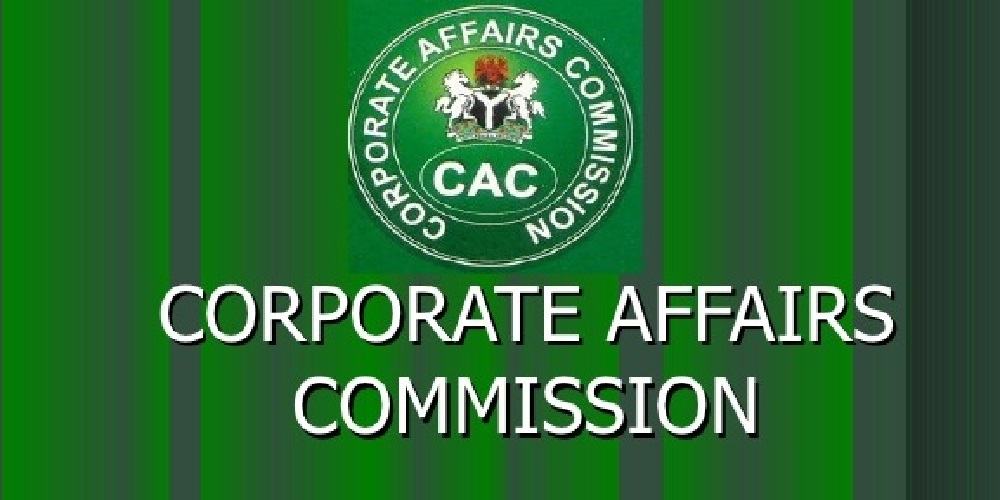Economy
CAC issues guidelines for banks recapitalisation, merger

The Corporate Affairs Commission has issued fresh guidelines to assist Deposit Money Banks in the ongoing recapitalisation.
The commission, in a statement signed by its management and posted on its Facebook account on Friday, said the new directive is pursuant to its powers under Section 8 (1) (e) of the Companies and Allied Matters Act No. 3 of 2020, stressing immediate adherence to the policy.
It said the new guidelines were issued to guide proper filing for new incorporations, increase in share capitals, mergers and upgrade or downgrade of licence authorisation.
For new incorporations, the CAC stated that intending applicants must submit necessary requirements including, “An approved name reservation or availability, approval-in-principle from sector regulator, duly completed on-line incorporation form and payment of stamp duty and filing fees for the category of license authorisation.”
It added that a certificate of incorporation shall be issued within 24 hours for applications that satisfy all requirements for incorporation of companies prescribed in the, “Commission’s operations checklists available at www.cac.gov.ng/resources.”
Also, banking institutions seeking to increase their share capital through private placements, rights issues and/or offers for subscription must submit a duly signed company resolution, return of allotment and other statutory declaration by directors verifying that the issued share capital is fully paid- up
Other requirements include, “Notice of the fact that regulatory approval is required, an affidavit deposed to by a director of the company to the effect that regulatory approval is required for the increase, an amended memorandum of association reflecting the new share capital.
“Payment of stamp duties and filing fees, Issuance of a letter acknowledging notice of increase and requirement of regulatory approval, filing of regulatory approval and the issuance of a certificate of increase.”
Under this category, the commission warned that the notice of the fact that regulatory approval is required must be filed in accordance with the provisions of Section 127 (3), (4) & (5) of CAMA.
“Annual returns and information on persons with significant control must be filed up-to-date and certificate of increase shall be issued within 24 hours of filing of regulatory approval,” it said.
Similarly, small and medium banking institutions seeking to merge must submit duly signed special resolution for merger by each of the merging companies.
Other requirements are “the scheme of merger duly approved by the Securities and Exchange Commission.
“A certified true copy of court order authorising Extraordinary General Meeting of each of the merging companies. Evidence of publication of court ordered meeting in two newspapers and the Federal Gazette and a CTC of Court order sanctioning the Scheme of Merger.
“All enquiries and complaints on these guidelines and applications submitted in pursuance of the recapitalisation exercise should call +234 816 920 9551,” the statement added.
Recall that the Central Bank of Nigeria in March 2024 directed all banks to increase their capital base for improved productivity.
The apex bank had directed commercial banks with international authorisation to increase their capital base to N500bn and national banks to N200bn.
It also said commercial banks with national licences must meet a N200bn threshold, while those with regional authorisation are expected to achieve a N50bn capital floor.
This process has commenced fully with banks issuing public offers and rights issues to meet the two year target.
Economy
More Nigerians to experience poverty by 2027 – World Bank

The World Bank’s latest Africa’s Pulse report has projects a grim future for Nigeria, with poverty expected to rise by 3.6 percentage points by 2027.
Released during the IMF and World Bank Spring Meetings in Washington, DC, the report cites Nigeria’s reliance on oil, economic fragility, and governance challenges as key drivers.
It highlights the country’s structural economic weaknesses, dependence on oil revenues, and national fragility as key barriers to meaningful poverty reduction.
“Poverty in resource-rich, fragile countries, including large economies like Nigeria and the Democratic Republic of Congo, is projected to increase by 3.6 percentage points between 2022 and 2027,” the report stated.
Despite recent growth in Nigeria’s non-oil sector during the last quarter of 2024, the World Bank warns that this progress is unlikely to translate into widespread poverty alleviation due to ongoing fiscal and institutional challenges.
The report emphasizes that Sub-Saharan Africa remains the world’s poorest region, with an overwhelming 80% of the globe’s 695 million extreme poor residing there in 2024.
Within the region, half of the 560 million extremely poor people were located in just four countries, including Nigeria.
In stark contrast, South Asia accounted for 8% of the world’s extremely poor population, East Asia and the Pacific 2%, the Middle East and North Africa 5%, and Latin America and the Caribbean 3%.
The World Bank attributes the rising poverty in Nigeria and similar economies to weakening oil prices and fragile governance structures, noting: “This follows a well-established pattern whereby resource wealth combined with fragility or conflict is associated with the highest poverty rates, averaging 46% in 2024, which is 13 percentage points higher than in non-fragile, resource-rich countries.”
Meanwhile, non-resource-rich countries in Africa are experiencing stronger economic growth and faster poverty reduction, buoyed by high agricultural commodity prices and more resilient fiscal policies.
To reverse Nigeria’s downward poverty trend, the World Bank recommends reforms that prioritize inclusive economic growth and stronger public financial management.
It calls on the government to focus on “improving fiscal management and building a stronger fiscal contract with citizens to promote inclusive economic development and long-term poverty alleviation.”
Economy
SEE current exchange rate of the Dollar to Naira

What Is the Dollar to Naira Exchange Rate at the Black Market (Aboki FX)?
Here is the Dollar to Naira exchange rate at the parallel market, popularly known as the black market (Aboki fx), for Tuesday, April 23, 2025.
You can exchange your dollars for naira at the following rates:
Black Market Exchange Rate (Lagos – April 23, 2025):
According to sources at the Bureau De Change (BDC), the exchange rate at the Lagos parallel market saw traders buying at ₦1610 and selling at ₦1620 per US dollar.
It’s important to note that the Central Bank of Nigeria (CBN) does not recognize the black market. The CBN advises individuals seeking foreign exchange transactions to do so through their banks.
Dollar to Naira Exchange Rates
Market Type Buying Rate Selling Rate
Black Market ₦1610 ₦1620
CBN Official Rate ₦1591 (Low) ₦1606 (High)
Note: Forex rates vary across dealers and regions, and actual rates may differ from those listed.
Meanwhile, the Nigeria Customs Service (NCS) has announced the seizure of 298 smuggled items worth ₦7.6 billion between January and March 2025. The NCS also disclosed that it generated a total revenue of ₦1.75 trillion in the first quarter of the year.
Economy
Volvo announces termination of 800 U.S. workers, cites tariff, market decline

Volvo Group has announced plans to lay off up to 800 workers at three of its U.S. facilities over the next three months, citing ongoing market uncertainty and declining demand exacerbated by tariffs introduced under the administration of President Donald Trump.
The affected locations include the Mack Trucks plant in Macungie, Pennsylvania, as well as Volvo Group sites in Dublin, Virginia, and Hagerstown, Maryland.
In a statement on Friday, Volvo Group North America confirmed that between 550 and 800 employees would be impacted.
The company, a subsidiary of Sweden’s AB Volvo, employs nearly 20,000 people across North America.
The layoffs come amid wider turmoil in the automotive and manufacturing sectors, as shifting U.S. trade policy and a series of tariffs continue to drive up production costs. Economists have pointed to the uncertainty surrounding Trump’s trade strategy as a factor undermining both business and consumer confidence, with concerns mounting over a potential economic slowdown or recession.
According to Volvo, the company is grappling with a decline in heavy-duty truck orders, driven by instability in freight rates, anticipated regulatory changes, and the growing financial burden of tariffs. “We regret having to take this action, but we need to align production with reduced demand for our vehicles,” a company spokesperson stated in an email quoted by Reuters.
Volvo’s announcement marks another blow to an industry already navigating a complex web of supply chain challenges and fluctuating market conditions, with other manufacturers also warning of potential cost hikes and disruptions tied to global trade disputes.
-

 News19 hours ago
News19 hours agoList of World Leaders that are present in the final funeral of Pope Francis
-

 News15 hours ago
News15 hours agoJust in: Gunmen invade pro-Wike group in Bayelsa
-

 News23 hours ago
News23 hours agoDefections: Teejay Yusuf traces genesis of PDP palaver, key issues affecting Nigeria’s largest opposition party
-

 News24 hours ago
News24 hours agoCBEX: EFCC declares four persons wanted over crypto fraud + photos
-

 News19 hours ago
News19 hours ago2Face estranged wife, Annie Macauley breaks silence after he married Natasha
-

 News24 hours ago
News24 hours agoScandal! Osun monarch, pastor admit to COVID-19 fraud in US
-

 Politics22 hours ago
Politics22 hours agoUgochinyere remains Nigeria’s number one Hushpuppi of politics-Olayinka carpets Imo Rep
-

 Entertainment19 hours ago
Entertainment19 hours agoMohbad’s Inquest: Pathologist reveals major findings following 2nd autopsy





